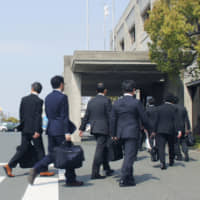The transport ministry inspected the headquarters of Suzuki Motor Corp. on Friday as part of an investigation into improper quality inspections that has led the automaker to recall more than 2 million cars in Japan.
Around a dozen ministry officials entered the building in Hamamatsu, Shizuoka Prefecture, to interview senior officials, check details regarding the misconduct and determine whether the preventive steps the carmaker has vowed to take are sufficient.
On Thursday Suzuki reported to the ministry a recall of 2.02 million cars — a record high for a single domestic filing — after an investigation by external lawyers found that uncertified employees had checked brakes before shipment and that some certified workers falsified inspection records over a period from 1981 until January this year.
An investigative report, released April 12 by Suzuki, showed that inspection misconduct had continued even after the automaker admitted to improper fuel-efficiency and emissions inspections in August last year.
Japan's auto industry, including giants Nissan Motor Co. and Subaru Corp., has been plagued by scandals involving the falsification of product quality data, including inspections by unqualified employees. Major chemical, steel and airplane parts manufacturers have also admitted to similar instances of malpractice.
"We will strictly deal with the matter if there is a need to take action" following the on-site investigation, Land, Infrastructure, Transport and Tourism Minister Keiichi Ishii told a news conference on Friday.
Suzuki said in a statement that the firm "will sincerely respond and cooperate fully with the transport ministry's investigation."
Suzuki's recall affected 29 models including the Spacia minicar and vehicles it made for Nissan, Mazda Motor Corp. and Mitsubishi Motors Corp.
Because of the recall the automaker will book a special loss of around ¥80 billion ($715 million) for fiscal 2018, which ended last month.



